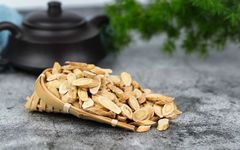Astragalus (Huang Qi), a traditional Chinese medicinal material, is known as the “King of Qi Tonics.” In ancient Chinese medical texts, Astragalus is often written as “Huang Qi,” where “Qi” refers to the elderly, implying that the medicinal effects of Astragalus are significant. Below, let us explore the efficacy and functions of Astragalus.
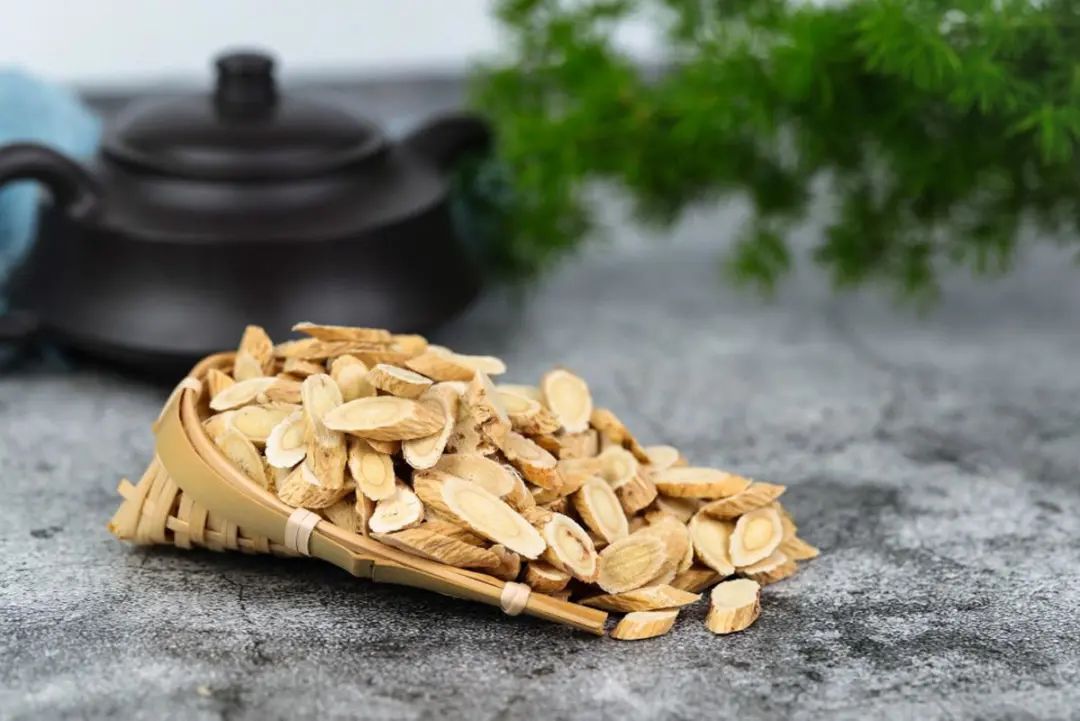 Astragalus is also known as “Mian Qi” and “Mian Huang Qi,” with the medicinal part being the root of the leguminous plant Astragalus. It is harvested in spring and autumn, cleaned of soil, fibrous roots, and root tips, then sun-dried until 60-70% dry, and bundled for further drying.
Astragalus is also known as “Mian Qi” and “Mian Huang Qi,” with the medicinal part being the root of the leguminous plant Astragalus. It is harvested in spring and autumn, cleaned of soil, fibrous roots, and root tips, then sun-dried until 60-70% dry, and bundled for further drying.
 The plant is a perennial herb with an erect stem and branching at the top. The odd-pinnate compound leaves are alternate, with 12-18 pairs of leaflets; the leaflets are broad-oval or oval, covered with soft hairs underneath; the stipules are lanceolate. The racemose inflorescence is axillary; the calyx is bell-shaped, densely covered with short soft hairs, with 5 calyx teeth; the corolla is yellow, with the banner petal being long oval-shaped, and the wing and keel petals having long claws; there are 10 stamens, in two groups; the ovary has a long stalk. The pod is membranous, semi-oval, and hairless. The flowering period is from June to July, and the fruiting period is from July to September.
The plant is a perennial herb with an erect stem and branching at the top. The odd-pinnate compound leaves are alternate, with 12-18 pairs of leaflets; the leaflets are broad-oval or oval, covered with soft hairs underneath; the stipules are lanceolate. The racemose inflorescence is axillary; the calyx is bell-shaped, densely covered with short soft hairs, with 5 calyx teeth; the corolla is yellow, with the banner petal being long oval-shaped, and the wing and keel petals having long claws; there are 10 stamens, in two groups; the ovary has a long stalk. The pod is membranous, semi-oval, and hairless. The flowering period is from June to July, and the fruiting period is from July to September.
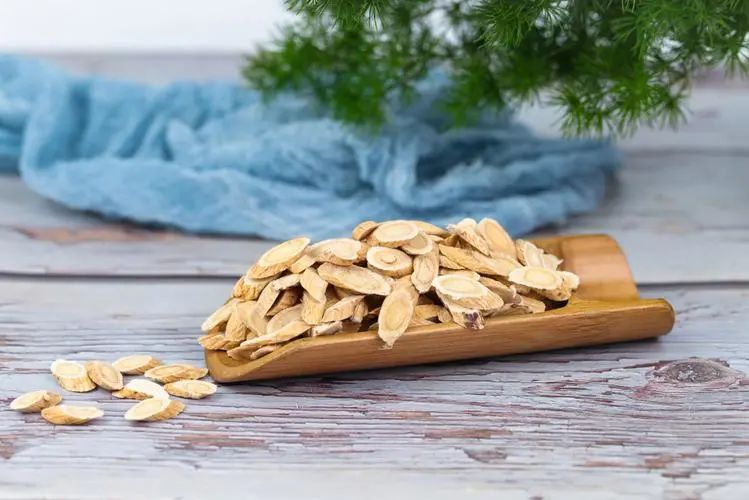 Taste and Properties: Sweet, slightly warm.
Taste and Properties: Sweet, slightly warm.
Meridians: Lung (Fei) and Spleen (Pi) meridians.
Functions and Indications: Tonifies Qi and stabilizes the exterior, promotes diuresis and detoxification, expels pus, and promotes tissue regeneration. It is used for Qi deficiency, fatigue, poor appetite, diarrhea, prolapse of the rectum, blood in stool, excessive sweating due to deficiency, Qi deficiency with edema, difficult-to-heal sores, chronic ulcers, blood deficiency with weakness, internal heat with thirst; chronic nephritis with proteinuria, and diabetes.
Dosage: 9-15 grams, can be increased to 30-60 grams for larger doses.
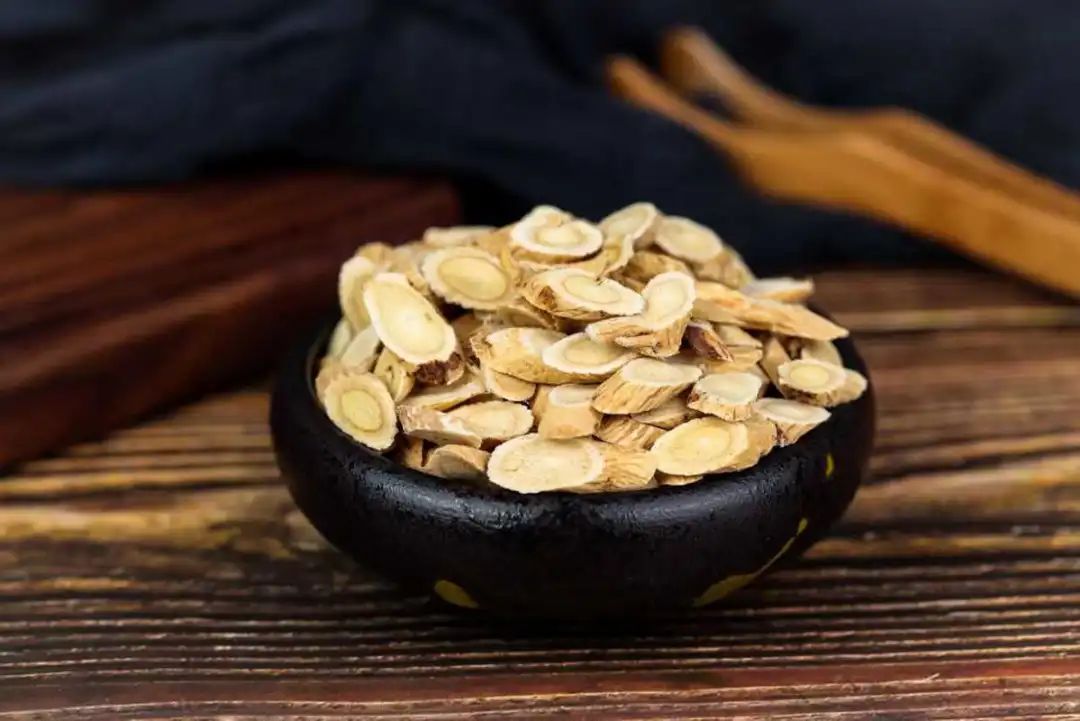 Efficacy and Functions of Astragalus
Efficacy and Functions of Astragalus
1. Enhances Immunity:
Astragalus contains rich active components such as flavonoids, polysaccharides, and various amino acids, all of which have significant immunomodulatory effects. Astragalus can enhance the function of the human immune system, improve the body’s resistance to diseases, and promote both cellular and humoral immunity.
Astragalus can treat fatigue and shortness of breath. Regular consumption of Astragalus can improve energy levels and gradually reduce shortness of breath. If combined with appropriate amounts of Fang Feng (Siler), ginger, and boiled in water, it can effectively enhance the body’s immune capacity and prevent colds.
2. Increases Antioxidant Capacity:
The flavonoids in Astragalus have significant antioxidant properties, capable of scavenging free radicals in the body and protecting cells from free radical damage. The antioxidant capacity of Astragalus helps prevent aging, cancer, and delays cellular senescence.
3. Anti-Fatigue:
The polysaccharides in Astragalus can increase the synthesis and release of adenosine triphosphate (ATP), thus providing more energy. Astragalus also promotes the synthesis and storage of liver glycogen, improving the body’s utilization of carbohydrates, reducing fatigue, and increasing physical strength and endurance.
4. Improves Sleep Quality:
Astragalus can regulate the function of the nervous system, soothe the nerves, and has a calming and sleep-inducing effect. Regular consumption of Astragalus can improve sleep quality and enhance sleep effectiveness.
5. Promotes Digestion and Absorption:
Astragalus has the effect of tonifying Qi and strengthening the spleen, which can increase gastric juice secretion, promote digestion, improve appetite, and enhance food absorption.
6. Antibacterial and Anti-Inflammatory:
The flavonoids and other components in Astragalus have significant antibacterial and anti-inflammatory effects, inhibiting various bacteria and viruses. Astragalus can strengthen the body’s resistance and prevent infections and inflammation.
7. Strengthens the Body:
Astragalus has the effect of strengthening the body. After taking Astragalus, the levels of albumin and total serum protein in the body significantly increase, and daily urine output also increases.
Drinking Astragalus tea has numerous benefits, especially in treating spleen Qi deficiency. Symptoms of spleen Qi deficiency include fatigue, shortness of breath, and excessive phlegm, so it is advisable to boil Astragalus with other herbs to treat this condition.
8. Lowers Blood Pressure:
Astragalus can treat hypertension, particularly in elderly patients who are prone to lower body edema. Drinking Astragalus tea can effectively reduce edema and lower blood pressure.
9. Prevents Iron-Deficiency Heart Disease:
Astragalus can treat iron-deficiency heart disease. After consuming Astragalus, it can effectively relieve angina and improve various clinical indicators, playing a significant role in restoring health.
10. Improves Diabetes:
Many diabetic patients experience edema and a waxy complexion. Drinking Astragalus tea, especially when combined with Ge Gen (Pueraria), is very effective. If ulcers occur, adding Ge Gen, Chi Shao (Red Peony), and Fan Shen (Codonopsis) can yield even better results.
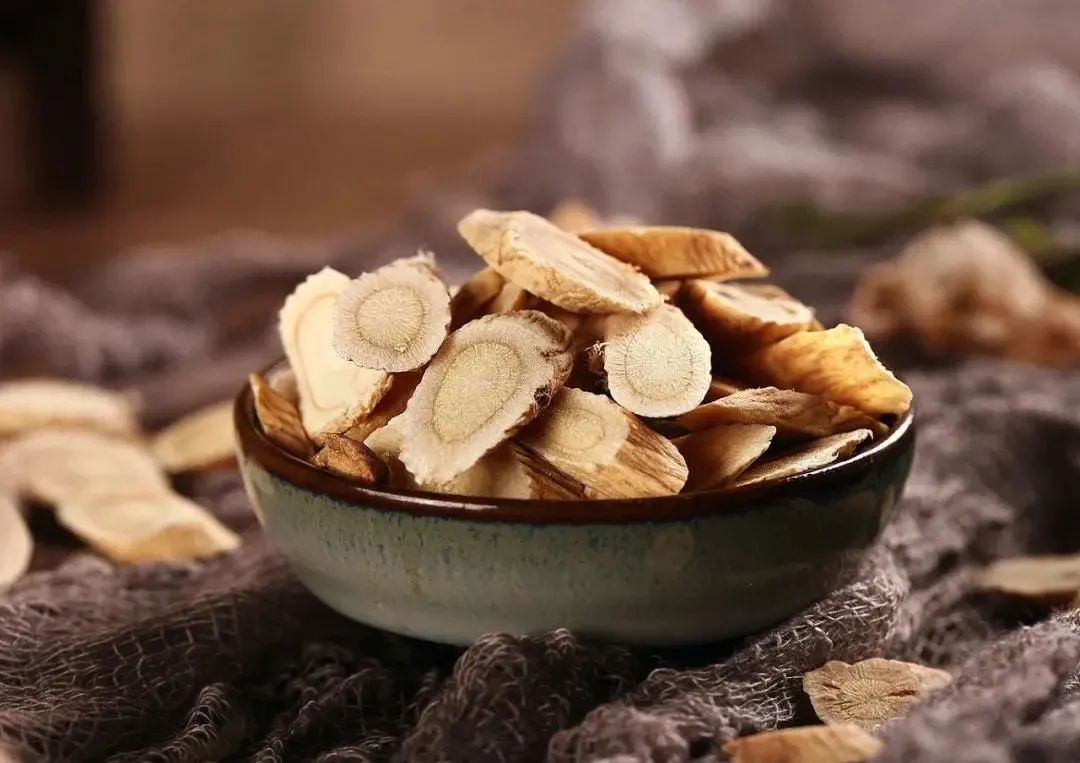 How to Properly Brew Astragalus Tea
How to Properly Brew Astragalus Tea
Astragalus is a commonly used Chinese herb, widely applied in traditional Chinese medicine. It has the effects of tonifying Qi, nourishing blood, invigorating Qi, and enhancing the immune system, making it popular among the public. However, when used alone, the effects of Astragalus may not be very pronounced; it is often necessary to combine it with other herbs to enhance its efficacy. When pairing Astragalus, one can choose based on individual health conditions and needs. Here are some common pairing methods for Astragalus.
First, the combination of Astragalus and Dang Gui (Angelica Sinensis). Dang Gui is a commonly used blood-nourishing herb, and when used with Astragalus, it can tonify Qi and nourish blood, especially suitable for those with anemia or Qi deficiency with blood stasis. We can boil Astragalus and Dang Gui together in water and drink daily to help regulate the body and enhance immunity.
Secondly, the combination of Astragalus and Goji Berries (Gou Qi Zi). Goji berries are a common tonic herb with kidney-tonifying and yang-invigorating effects. When used with Astragalus, it can tonify Qi and nourish blood, enhancing the immune system. We can boil Astragalus and Goji berries together in water, and drinking it can nourish the body and strengthen vitality.
Additionally, Astragalus can be paired with Ren Shen (Ginseng). Ren Shen is a commonly used Qi-tonifying herb, and when used with Astragalus, it can tonify Qi and nourish blood, improving symptoms of Qi deficiency and spleen-stomach weakness. We can boil Astragalus and Ren Shen together in water and drink daily to enhance immunity and strengthen resistance.
Finally, the combination of Astragalus and Shu Di Huang (Rehmannia). Shu Di Huang is a common yin-nourishing herb, and when used with Astragalus, it can tonify Qi, nourish blood, and nourish yin, especially suitable for those with both Qi and blood deficiency, and yin deficiency with yang deficiency. We can boil Astragalus and Shu Di Huang together in water and drink daily to help improve weakness and regulate insomnia.
 Precautions for Astragalus
Precautions for Astragalus
1. Do not consume in excess.
Although Astragalus is highly nutritious, it is important to note that the dosage should be appropriate; excessive use may lead to adverse reactions such as dry mouth, loss of appetite, or diarrhea.
2. Consult a doctor.
Before using Astragalus, it is advisable to consult a doctor to ensure safe usage. Additionally, pregnant women, infants, and patients with specific diseases should use Astragalus with caution.
3. Astragalus is generally effective only with long-term use; those with physical weakness and soft muscles are also not suitable for Astragalus!
4. Not recommended during menstruation.
Women should not consume Astragalus during their menstrual period, as it may cause menstrual irregularities.
5. Not suitable for those with colds and fevers.
For patients with colds and fevers, Astragalus is also not suitable, as it may affect the body’s cooling mechanism and prolong fever duration.
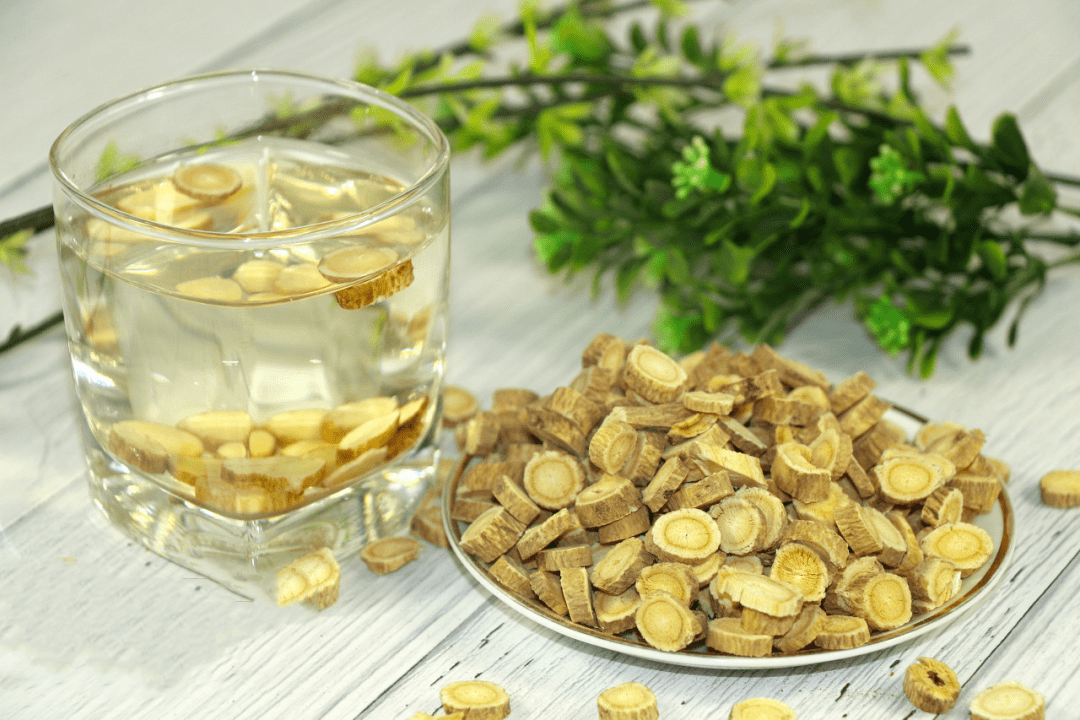 Methods of Consuming Astragalus
Methods of Consuming Astragalus
1. Soup:
Boil Astragalus with other ingredients to enhance the nutritional value of the soup. It can be paired with pork bones, chicken, or other herbs, and simmered for 2-3 hours until the Astragalus turns translucent.
2. Brewed Water:
Slice or grind Astragalus into powder, add it to boiling water, and brew. Consume 1-2 times daily, with each dose being 6-9 grams.
3. Pork Bone Astragalus Soup:
Simmer Astragalus with pork bones to enhance the soup’s nourishing effects. First, blanch the pork bones to remove blood and impurities, then add Astragalus to the pot with an appropriate amount of water, heat, and simmer on low for 2-3 hours.
4. Astragalus Chicken:
Simmer chicken with Astragalus to increase the dish’s nutritional value. First, blanch the chicken, then add it to the pot with Astragalus and an appropriate amount of water, heat, and simmer on low for 2-3 hours.
5. Astragalus Congee:
Grind Astragalus into powder and add it to the rice when cooking congee. Astragalus congee can tonify Qi and nourish blood, suitable for fatigue and poor appetite.

